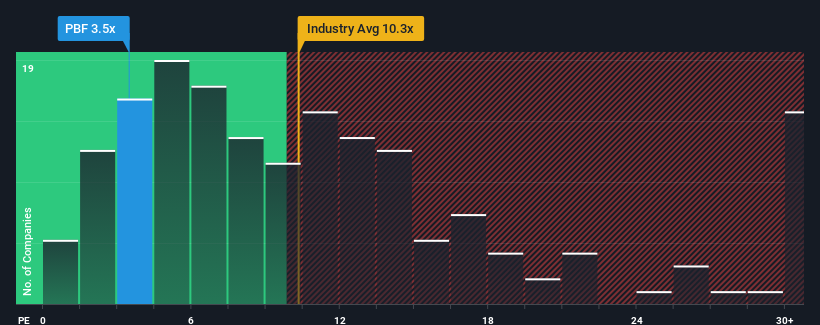
When close to half the companies in the United States have price-to-earnings ratios (or "P/E's") above 18x, you may consider PBF Energy Inc. (NYSE:PBF) as a highly attractive investment with its 3.5x P/E ratio. Nonetheless, we'd need to dig a little deeper to determine if there is a rational basis for the highly reduced P/E.
With earnings that are retreating more than the market's of late, PBF Energy has been very sluggish. It seems that many are expecting the dismal earnings performance to persist, which has repressed the P/E. If you still like the company, you'd want its earnings trajectory to turn around before making any decisions. If not, then existing shareholders will probably struggle to get excited about the future direction of the share price.
Check out our latest analysis for PBF Energy

Does Growth Match The Low P/E?
There's an inherent assumption that a company should far underperform the market for P/E ratios like PBF Energy's to be considered reasonable.
Retrospectively, the last year delivered a frustrating 27% decrease to the company's bottom line. At least EPS has managed not to go completely backwards from three years ago in aggregate, thanks to the earlier period of growth. Accordingly, shareholders probably wouldn't have been overly satisfied with the unstable medium-term growth rates.
Looking ahead now, EPS is anticipated to slump, contracting by 42% per annum during the coming three years according to the eleven analysts following the company. With the market predicted to deliver 10% growth per year, that's a disappointing outcome.
With this information, we are not surprised that PBF Energy is trading at a P/E lower than the market. However, shrinking earnings are unlikely to lead to a stable P/E over the longer term. There's potential for the P/E to fall to even lower levels if the company doesn't improve its profitability.
The Bottom Line On PBF Energy's P/E
Using the price-to-earnings ratio alone to determine if you should sell your stock isn't sensible, however it can be a practical guide to the company's future prospects.
We've established that PBF Energy maintains its low P/E on the weakness of its forecast for sliding earnings, as expected. At this stage investors feel the potential for an improvement in earnings isn't great enough to justify a higher P/E ratio. Unless these conditions improve, they will continue to form a barrier for the share price around these levels.
And what about other risks? Every company has them, and we've spotted 3 warning signs for PBF Energy (of which 2 shouldn't be ignored!) you should know about.
If these risks are making you reconsider your opinion on PBF Energy, explore our interactive list of high quality stocks to get an idea of what else is out there.
New: Manage All Your Stock Portfolios in One Place
We've created the ultimate portfolio companion for stock investors, and it's free.
• Connect an unlimited number of Portfolios and see your total in one currency
• Be alerted to new Warning Signs or Risks via email or mobile
• Track the Fair Value of your stocks
Have feedback on this article? Concerned about the content? Get in touch with us directly. Alternatively, email editorial-team (at) simplywallst.com.
This article by Simply Wall St is general in nature. We provide commentary based on historical data and analyst forecasts only using an unbiased methodology and our articles are not intended to be financial advice. It does not constitute a recommendation to buy or sell any stock, and does not take account of your objectives, or your financial situation. We aim to bring you long-term focused analysis driven by fundamental data. Note that our analysis may not factor in the latest price-sensitive company announcements or qualitative material. Simply Wall St has no position in any stocks mentioned.
About NYSE:PBF
PBF Energy
Through its subsidiaries, engages in refining and supplying petroleum products.
Excellent balance sheet and fair value.
Similar Companies
Market Insights
Community Narratives




